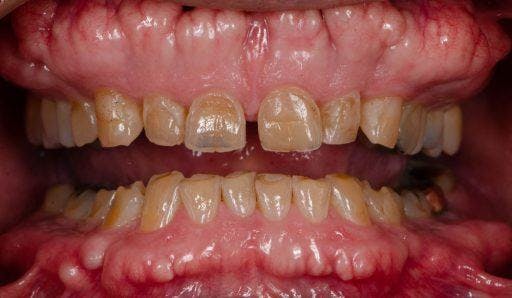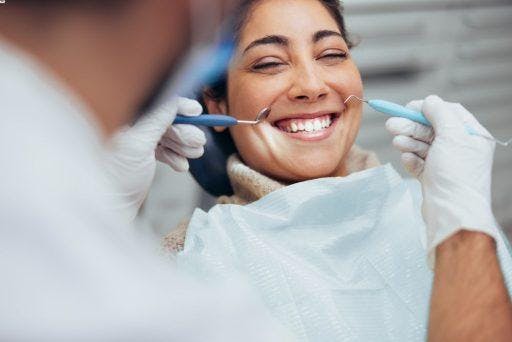Did you know that the first sign of potential cavities is enamel erosion? Your enamel is your teeth’s first layer of defense and the first to break down thanks to exposure – from the effort of biting and chewing to the food and drink you consume.
Learn more about your dental enamel and how you can protect your teeth and flash a healthy smile every day.
What is enamel erosion?
Enamel erosion, otherwise known as dental erosion or erosive tooth wear, refers to the loss of tooth structure from contact with acids. Frequent acid exposure can dissolve the protective layer of enamel on the tooth, exposing the delicate dentin underneath. When this happens, the tooth’s surface can soften and become more vulnerable to abrasion.
What causes enamel erosion?
You already know that acids are the main culprit, but they can come from different sources – either extrinsic or intrinsic. Extrinsic factors include foods or drinks, such as soda, citrus fruits, and alcoholic beverages. Some additives, like citric and ascorbic acid, and medication, like chewable vitamin C supplements, also have erosive properties.
Meanwhile, intrinsic factors generally refer to acids rising from the stomach, which can happen after vomiting or as an effect of certain health conditions like gastroesophageal reflux disease (GERD). Apart from acids, persistent dry mouth also carries significant erosive risks. That’s because healthy saliva flow is essential to neutralising acid. Some possible causes of dry mouth include medication, smoking, and diabetes.
Observable symptoms of enamel erosion

Now that you know what enamel erosion is and what might cause it, you might wonder– do you have it? Here are a few telltale signs to look out for.
Sign #1: Your teeth might develop a silky, glossy appearance.
According to the American Dental Association, dental erosion can manifest as a visible loss of enamel texture. As a result, teeth can look smooth, shiny, and even “melted.” They also note that occlusal (chewing or grinding) surfaces may appear “cupped, flattened, or smoothed.”
Sign #2: They can become more sensitive to external stimuli.
“Teeth often become sensitive when the outside layer of teeth that provides protection is worn away,” explains the Australian Dental Association. This tough outer layer (enamel) protects the dentin, which connects to the teeth’s nerves. These nerves are what allow you to feel sensations from external stimuli. When the dentin is exposed, your teeth become more sensitive to hot, cold, or acidic foods and drinks.
Sign #3: They may appear discoloured or yellowish.
Dentin is typically a pale-yellow colour. It shows through the enamel, which is why natural teeth are rarely blindingly white. The more eroded the enamel is, the more visible the dentin becomes on the surface. Thus, discoloured or yellowish teeth can signal dental erosion.
Treatment for enamel erosion

The first thing you need to do if you believe you have dental erosion is consult a dental professional. Don’t rely solely on your observations or jump straight into self-treating. Tell your dentist about the symptoms you’re experiencing so they can perform a thorough oral examination. They may also investigate your medical history to assess risk factors contributing to your condition.
Once your diagnosis is in, you can work with them to determine a suitable plan, including lifestyle and dietary changes to reduce side effects. They may recommend restorative treatments like fillings or crowns for eroded teeth. If you’re dealing with dentin hypersensitivity, they may apply a fluoride gel to reduce sensation in the affected areas.
At home, you might want to switch to a desensitising toothpaste for management. Be sure to see your dentist every six to 12 months for continued observation.
How to prevent the erosion of tooth enamel

In cases of dental erosion, prevention and reduction will always be better than management. Why? The American Dental Association explains, “[The condition] results in progressive and irreversible loss of mineralised tooth substance.” Here’s what you can do to prevent erosion before it’s too late.
Tip #1: Limit your intake of acidic foods and beverages.
There’s a common belief that only sour-tasting food and drink are acidic, but that’s untrue. Some of the most highly acidic and damaging substances for your teeth include soda and energy drinks, especially when carbonated. You should also consume citrus fruits, tomato products, and coffee in moderation.
Tip #2: Treat acid reflux and other gastrointestinal issues.
Do you have frequent episodes of acid reflux? Talk to your doctor about treatment. When acid reflux persists, it can lead to GERD, a more serious form of the condition. People with GERD may have trouble rebalancing the acids in their mouth, which can cause significant dental erosion over time.
Tip #3: Avoid overbrushing.
As you probably know, overbrushing means brushing your teeth too vigorously, which can wear down your enamel. While it’s essential to be consistent with your oral hygiene habits, improper brushing can be worse than not brushing at all. So, be gentle but thorough. Brush for two minutes at least twice daily using high-fluoride toothpaste and a soft-bristled toothbrush.
Are you undergoing orthodontic treatment with ClearCorrect aligners? You may need to brush after every meal to dislodge food particles and wash away stubborn acids before popping your aligners back on. Give your appliance a thorough rinse to reduce bacteria buildup, too.
The good news? If you follow proper hygiene, your enamel will be safer and stronger with these invisible aligners. ClearCorrect is tear- and stain-resistant and would absorb potential wear and tear from daily oral activities.
Tip #4: Drink lots of water.
Dehydration can reduce the amount of saliva you produce, so remember to drink lots of water. Replace soda and fruit juices with good old H2O, then cap off every meal with a big glass. In Australia, the tap water is fluoridated, which can help protect your teeth from erosion. As much as possible, rinse your mouth after consuming anything acidic to keep the acids from lingering on your teeth.
If you think you might be dealing with enamel erosion, make an appointment with your dentist ASAP. In the meantime, do what you can to protect your teeth – avoid acids, brush properly, and stay hydrated.
References:
American Dental Association. (n.d.). Dental erosion. ADA.org.
Australian Dental Association. (n.d.-b). Sensitive teeth. Teeth.org.au.
Department of Health & Human Services. (n.d.-b). Dental erosion. Better Health Channel.



